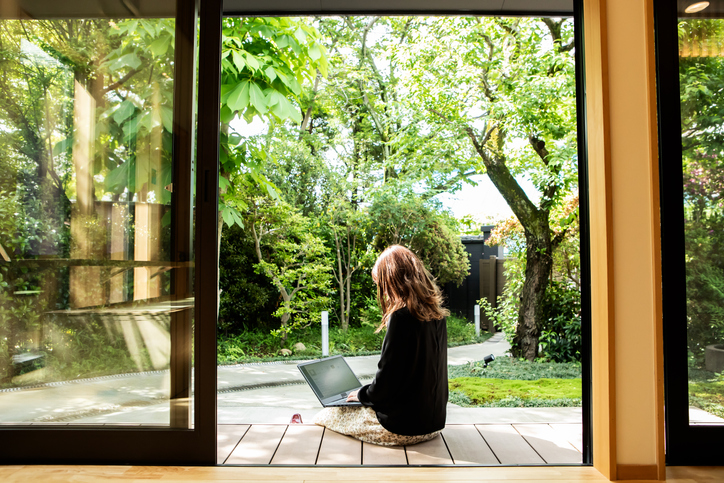A Workout For Your Mental Health
Keep stress from the Covid pandemic and other events under control by sticking with these daily practices.
Stressed out? Grumpy? Tired all the time?
You need a mental-fitness regimen.
For months, therapists have reported a significant increase in clients who are anxious, worried or depressed over current events—the Covid-19 pandemic, economic woes, civil unrest. And while they can teach coping skills, such as emotion regulation, to help deal with the stress, they say it’s also important for people to proactively take steps to be mentally healthy, just as they would if they wanted to be physically fit. “If you wait until a major stressor hits to try and bolster your mental health, it’s like trying to inflate your life raft while you are already drowning at sea,” says Wendy Troxel, a clinical psychologist and senior behavioural and social scientist at Rand Corp.
Many people turn to talk therapy, exercise, meditation and a healthy diet to do this. Shirlee Hoffman, a 75-year-old retired marketing consultant in Chicago, limits her news consumption to about five minutes a day. Erin Wiley, 50, a licensed psychotherapist in Toledo, Ohio, uses an app to track the things for which she is grateful. Rhonda Steele, 62, a special-education teacher in Sellersburg, Ind., prays and reads devotions. Dwight Oxley, 84, a retired physician in Wichita, Kan., reads and plays the piano. Rachel Glyn, 66, a retired aesthetician in Philadelphia, tries to do as many things as possible for others. Michael Schauch, 40, an investment portfolio manager in Squamish, British Columbia, rock climbs—he says the view gives him perspective. Stedman Stevens, 62, the CEO of an aviation technology company in Wilmington, N.C., takes 15 minutes each afternoon to sit alone without distractions. “I listen to what my mind shows me,” he says. “This restores my mental strength.”
What steps should you include in your mental-fitness regimen? Here is advice from the experts.
Make sleep non-negotiable
Most adults need 7-8 hours of quality sleep. “Following a consistent sleep-wake schedule sends a powerful signal to the brain that the world is safe and secure, which can help reduce anxiety and foster resilience,” says Rand’s Dr Troxel, author of “Sharing the Covers: Every Couple’s Guide to Better Sleep.” She suggests setting a consistent wake-up time, counting backward to determine when to go to bed, and creating a relaxing wind-down routine, starting an hour before bedtime. Take a bath, read a book, turn down the lights and the thermostat. (18-20 degrees is ideal.) Disconnect from technology to minimize your exposure to distressing news and light.
Set a routine
Get up at the same time each day. Get dressed! Create a morning ritual—many people write in a journal or set an intention for the day, although just drinking coffee in the same chair works. (I drink a large glass of water first thing, then a cup of coffee, and play with my dog.) Eat meals and exercise at set times. This helps create a sense of predictability in a world that feels out of control.
Calm your mind
You can’t cope with stress well if your brain is on high alert at all times, says Carolyn Daitch, a psychologist in Farmington Hills, Mich., and co-author of “The Road to Calm Workbook.” She recommends beginning the day with 15-20 minutes of yoga, meditation or prayer, then scheduling four “mini interventions” during the day—a two-minute breathing exercise or other quick tension-releasing technique. (One of her favourites: Make a tight fist with one hand, imagine it holding all the tension in your body for 10 seconds, release it.) She says to think of these practices as a “stress inoculation.”
Watch your language
The words we use to talk to ourselves colour our outlook. So try to replace “hot” language with “cooler” language, suggests Patricia Deldin, a professor of psychology and psychiatry at the University of Michigan, Ann Arbor. (“This is a challenge but I can handle it,” not “I’m overwhelmed.”) And stop “shoulding” yourself. (“I would like to…” not “I should.”) “A simple language change can influence our feelings and, subsequently, our actions,” says Dr Deldin, who is CEO of Mood Lifters, a mental-wellness program.
Practice compassion
Research shows self-compassionate people are happier, more optimistic, more motivated and more resilient. Yet, too often, we are mean to ourselves. Treat yourself with kindness and understanding. Start by acknowledging when something is painful. (Dr Daitch recommends putting your hand on your heart and saying: “This isn’t easy.”) Then talk to yourself as you would to your best friend. And remind yourself that everyone goes through difficult times. This diminishes your stress reaction and connects you to other people.
Move your body
Research shows that aerobic exercise reduces fatigue and tension, and improves alertness, concentration, sleep, mood, and self-esteem, according to Dr Deldin. And studies show that exercise in nature has even more benefits: It reduces the body’s stress response, lowers cortisol levels and blood pressure, and it gives you a sense of awe, which boosts mood. Dr Deldin recommends 30 minutes of moderate exercise a day, which can be broken up into small periods. (Even five minutes of exercise begins to decrease anxiety, she says.)
Create a media diet
There’s too much negative news these days. Decide how much you will consume—think of this as a “news calorie count”—and stick with it. Set aside blocks of time to turn off your phone. Purge negative people from your social media feed. Look for positive streams to follow or articles to read. (My feeds are largely about sailing, scuba diving, gardening or baking.)
Choose extracurricular activities wisely
Research shows that pleasant activities, ones that give you a sense of purpose (such as volunteering), and ones that make you feel accomplished or masterful (such as learning a language) improve mental health. So pick up a new hobby, practice an instrument, work on improving at a sport. “The ability to exert control over something provides a sense of self-satisfaction and contentment,” says Brad Stulberg, an executive coach in Asheville, N.C., and author of “Peak Performance.” “And progress nourishes the soul.”
Cultivate supportive relationships
People with strong relationships are emotionally healthier. So make a commitment to connect regularly with friends and family. Set a goal to reach out to one person a day. Ask about the other person and discuss something other than the day’s awful news. And be open about how you are, because vulnerability can be bonding.
Be grateful
Especially for your loved ones. And let them know. Everyone is feeling challenged right now. When I’m annoyed with someone in my life, I think of at least five things I love about the person. Often, I’m surprised that my list goes on and on. I’m smiling before I’m done counting.
 Copyright 2020, Dow Jones & Company, Inc. All Rights Reserved Worldwide. LEARN MORE
Copyright 2020, Dow Jones & Company, Inc. All Rights Reserved Worldwide. LEARN MORE
This stylish family home combines a classic palette and finishes with a flexible floorplan
Just 55 minutes from Sydney, make this your creative getaway located in the majestic Hawkesbury region.
As Paris makes its final preparations for the Olympic games, its residents are busy with their own—packing their suitcases, confirming their reservations, and getting out of town.
Worried about the hordes of crowds and overall chaos the Olympics could bring, Parisians are fleeing the city in droves and inundating resort cities around the country. Hotels and holiday rentals in some of France’s most popular vacation destinations—from the French Riviera in the south to the beaches of Normandy in the north—say they are expecting massive crowds this year in advance of the Olympics. The games will run from July 26-Aug. 1.
“It’s already a major holiday season for us, and beyond that, we have the Olympics,” says Stéphane Personeni, general manager of the Lily of the Valley hotel in Saint Tropez. “People began booking early this year.”
Personeni’s hotel typically has no issues filling its rooms each summer—by May of each year, the luxury hotel typically finds itself completely booked out for the months of July and August. But this year, the 53-room hotel began filling up for summer reservations in February.
“We told our regular guests that everything—hotels, apartments, villas—are going to be hard to find this summer,” Personeni says. His neighbours around Saint Tropez say they’re similarly booked up.
As of March, the online marketplace Gens de Confiance (“Trusted People”), saw a 50% increase in reservations from Parisians seeking vacation rentals outside the capital during the Olympics.
Already, August is a popular vacation time for the French. With a minimum of five weeks of vacation mandated by law, many decide to take the entire month off, renting out villas in beachside destinations for longer periods.
But beyond the typical August travel, the Olympics are having a real impact, says Bertille Marchal, a spokesperson for Gens de Confiance.
“We’ve seen nearly three times more reservations for the dates of the Olympics than the following two weeks,” Marchal says. “The increase is definitely linked to the Olympic Games.”

Getty Images
According to the site, the most sought-out vacation destinations are Morbihan and Loire-Atlantique, a seaside region in the northwest; le Var, a coastal area within the southeast of France along the Côte d’Azur; and the island of Corsica in the Mediterranean.
Meanwhile, the Olympics haven’t necessarily been a boon to foreign tourism in the country. Many tourists who might have otherwise come to France are avoiding it this year in favour of other European capitals. In Paris, demand for stays at high-end hotels has collapsed, with bookings down 50% in July compared to last year, according to UMIH Prestige, which represents hotels charging at least €800 ($865) a night for rooms.
Earlier this year, high-end restaurants and concierges said the Olympics might even be an opportunity to score a hard-get-seat at the city’s fine dining.
In the Occitanie region in southwest France, the overall number of reservations this summer hasn’t changed much from last year, says Vincent Gare, president of the regional tourism committee there.
“But looking further at the numbers, we do see an increase in the clientele coming from the Paris region,” Gare told Le Figaro, noting that the increase in reservations has fallen directly on the dates of the Olympic games.
Michel Barré, a retiree living in Paris’s Le Marais neighbourhood, is one of those opting for the beach rather than the opening ceremony. In January, he booked a stay in Normandy for two weeks.
“Even though it’s a major European capital, Paris is still a small city—it’s a massive effort to host all of these events,” Barré says. “The Olympics are going to be a mess.”
More than anything, he just wants some calm after an event-filled summer in Paris, which just before the Olympics experienced the drama of a snap election called by Macron.
“It’s been a hectic summer here,” he says.

AFP via Getty Images
Parisians—Barré included—feel that the city, by over-catering to its tourists, is driving out many residents.
Parts of the Seine—usually one of the most popular summertime hangout spots —have been closed off for weeks as the city installs bleachers and Olympics signage. In certain neighbourhoods, residents will need to scan a QR code with police to access their own apartments. And from the Olympics to Sept. 8, Paris is nearly doubling the price of transit tickets from €2.15 to €4 per ride.
The city’s clear willingness to capitalise on its tourists has motivated some residents to do the same. In March, the number of active Airbnb listings in Paris reached an all-time high as hosts rushed to list their apartments. Listings grew 40% from the same time last year, according to the company.
With their regular clients taking off, Parisian restaurants and merchants are complaining that business is down.
“Are there any Parisians left in Paris?” Alaine Fontaine, president of the restaurant industry association, told the radio station Franceinfo on Sunday. “For the last three weeks, there haven’t been any here.”
Still, for all the talk of those leaving, there are plenty who have decided to stick around.
Jay Swanson, an American expat and YouTuber, can’t imagine leaving during the Olympics—he secured his tickets to see ping pong and volleyball last year. He’s also less concerned about the crowds and road closures than others, having just put together a series of videos explaining how to navigate Paris during the games.
“It’s been 100 years since the Games came to Paris; when else will we get a chance to host the world like this?” Swanson says. “So many Parisians are leaving and tourism is down, so not only will it be quiet but the only people left will be here for a party.”
This stylish family home combines a classic palette and finishes with a flexible floorplan
Just 55 minutes from Sydney, make this your creative getaway located in the majestic Hawkesbury region.






















